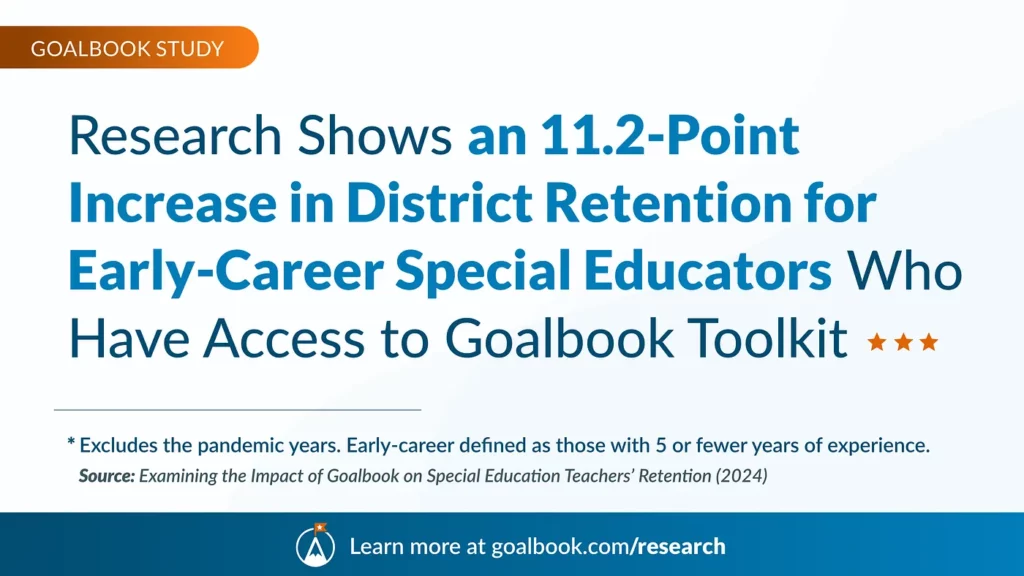A 2024 study conducted by researchers at the University of North Carolina at Greensboro shed light on the relationship between special educators’ access to Goalbook Toolkit and special educator retention in North Carolina. This analysis provides valuable insights into the challenges of retaining qualified special education teachers and potential solutions.
Research Design and Methodology
The study employed a rigorous research design to evaluate Goalbook Toolkit access and the relationship with special educator retention. Researchers used an event study model that compared the retention rates of special education teachers in North Carolina school districts that implemented Goalbook Toolkit to two comparison groups:
- The same North Carolina districts prior to Goalbook Toolkit implementation
- Similar North Carolina districts that have not implemented Goalbook Toolkit
This approach allowed the researchers to isolate the effect of Goalbook Toolkit while controlling for other factors that might influence teacher retention. The analysis utilized statewide data from the North Carolina Education Research Data Center, covering the 2012–13 to 2022–23 school years. Retention was measured in two ways:
- Special educator employment in the same district the following year
- Special educator employment anywhere in North Carolina public schools the following year
Sample and Data Collection
Identifying special educators within the state presented a unique challenge, as North Carolina data does not explicitly label teachers by specialty/subject area. To overcome this challenge, the researchers developed a method using salary data:
- Researchers first identified individuals with teacher-related roles based on salary object codes.
- Researchers then narrowed the sample to those educators with instructional responsibilities using budget purpose codes.
- Finally, researchers classified teachers as special educators if 50% or more of their gross pay came from special education activities or services.
The study focused on four districts that implemented Goalbook Toolkit:
- Nash-Rocky Mount (starting 2013–14)
- Durham (starting 2016–17)
- Guilford (starting 2017–18)
- Vance (starting 2018–19)
Nine comparison districts with similar size and student demographics were also included in the analysis.
Key Findings
The study found a statistically significant positive impact of Goalbook Toolkit access on the retention of novice special educators (those with five or fewer years of experience). For novice special educators with access to Goalbook Toolkit, a 9.1 percentage point increase in retention rates was identified for in district retention and an 8.2 percentage point increase was identified in state retention of the novice special educators. This aligns with other research which has highlighted the positive relationship between support for early career educators and their retention. For example, studies have shown that mentoring and induction programs can decrease attrition and turnover for new teachers (Jung, 2021; Ingersoll & Strong, 2011).
The findings from this study were more pronounced when excluding data from the 2020–21 and 2021–22 school years, which were likely affected by the pandemic. In this analysis, district retention for novice special educators with access to Goalbook Toolkit increased by 11.2 percentage points in comparison to novice special educators with no access to Goalbook Toolkit.

Implications for Education
High rates of special educator attrition make it challenging for school districts to provide qualified special educators for students with special needs. The positive impact of Goalbook Toolkit access on novice special educator retention offers several important implications for education leaders.
1. Supporting Early Career Special Educators
The findings suggest that Goalbook Toolkit provides valuable support to new and early career special educators, potentially easing their transition into the profession. This is crucial, as the first few years of teaching are often the most challenging and the timeframe within which many educators decide to leave special education or altogether the education field. Prior research has indicated that up to 9.3% of special education teachers leave the field at the end of their first year of teaching and 7.4% move to general education yearly (Horrison-Collier, 2013).
High rates of special educator attrition make it challenging for school districts to provide qualified special educators for students with special needs. The positive impact of Goalbook Toolkit access on novice special educator retention offers several important implications for education leaders.
2. Addressing the Special Education Teacher Shortage
As a valuable support to new and early career special educators, Goalbook Toolkit could help alleviate the persistent shortage of qualified special education professionals. The majority of public school districts nationwide face an ongoing cycle of recruitment, hiring, and induction for special educators. Implementation of Goalbook Toolkit to support special educators has the potential to improve continuity of services for students with disabilities and reduce the burden on school districts to constantly recruit and train new staff.
3. Cost-Effective Retention Strategy
Implementing Goalbook Toolkit may be a cost-effective way for districts and states to improve their retention of special educators. According to the National Coalition on Personnel Shortages in Special Education and Related Services (2024), the turnover rate for special education teachers is 25% higher than that of general education teachers. This could lead to long-term savings by reducing turnover-related expenses and maintaining a more experienced workforce.
4. Targeted Support for New Teachers
The study’s results highlight the importance of providing targeted resources and support to novice special educators. Education leaders should consider how Goalbook Toolkit, a holistic research-based solution, could be integrated into comprehensive induction and mentoring programs. Goalbook’s holistic approach blends technology with comprehensive professional development, services, and support that empower districts to invest in developing their most impactful instructional lever: their educators. The professional learning opportunities provided by Goalbook’s team and the ongoing access special educators have to Goalbook Toolkit resources provide targeted support in two critical areas often cited by special educators for leaving the profession — lack of professional learning opportunities and working conditions (Brunsting, N. C. et. al., 2023).
Conclusion
This research provides valuable insight into the potential of Goalbook Toolkit to support special educator retention, particularly for novice special education teachers. As schools and districts continue to grapple with special educator shortages and retention challenges, the findings from this study suggest that Goalbook Toolkit offers valuable resources that could make a meaningful difference in the critical early years of a special educator’s career.
District and state education leaders should consider these results as they develop strategies to support and retain special educators. With over 10+ years of research showing how, and in what ways, Goalbook Toolkit improves special educator effectiveness and student outcomes, Goalbook Toolkit is an investment that helps to build, augment, and sustain educator effectiveness, leading to improved student outcomes.
Citations
Brunsting, N. C., Bettini, E., Rock, M., Common, E. A., Royer, D. J., Lane, K. L., Xie, F., Chen, A., & Zeng, F. (2023). Working Conditions and Burnout of Special Educators of Students With EBD: Longitudinal Outcomes. Teacher Education and Special Education, 46(1), 44–64. https://doi.org/10.1177/08884064221076159
Horrison-Collier, A. (2013). Special education teacher retention: The relationship between mentoring, job satisfaction and the retention of special education teachers.
Ingersoll, R. M., & Strong, M. (2011). The Impact of Induction and Mentoring Programs for Beginning Teachers: A Critical Review of the Research. Review of Educational Research, 81(2), 201–233.
Jung, J. A. (2021). Positive influences on why they stay: A qualitative study on the contributing factors to teacher retention in Rural North Dakota.







